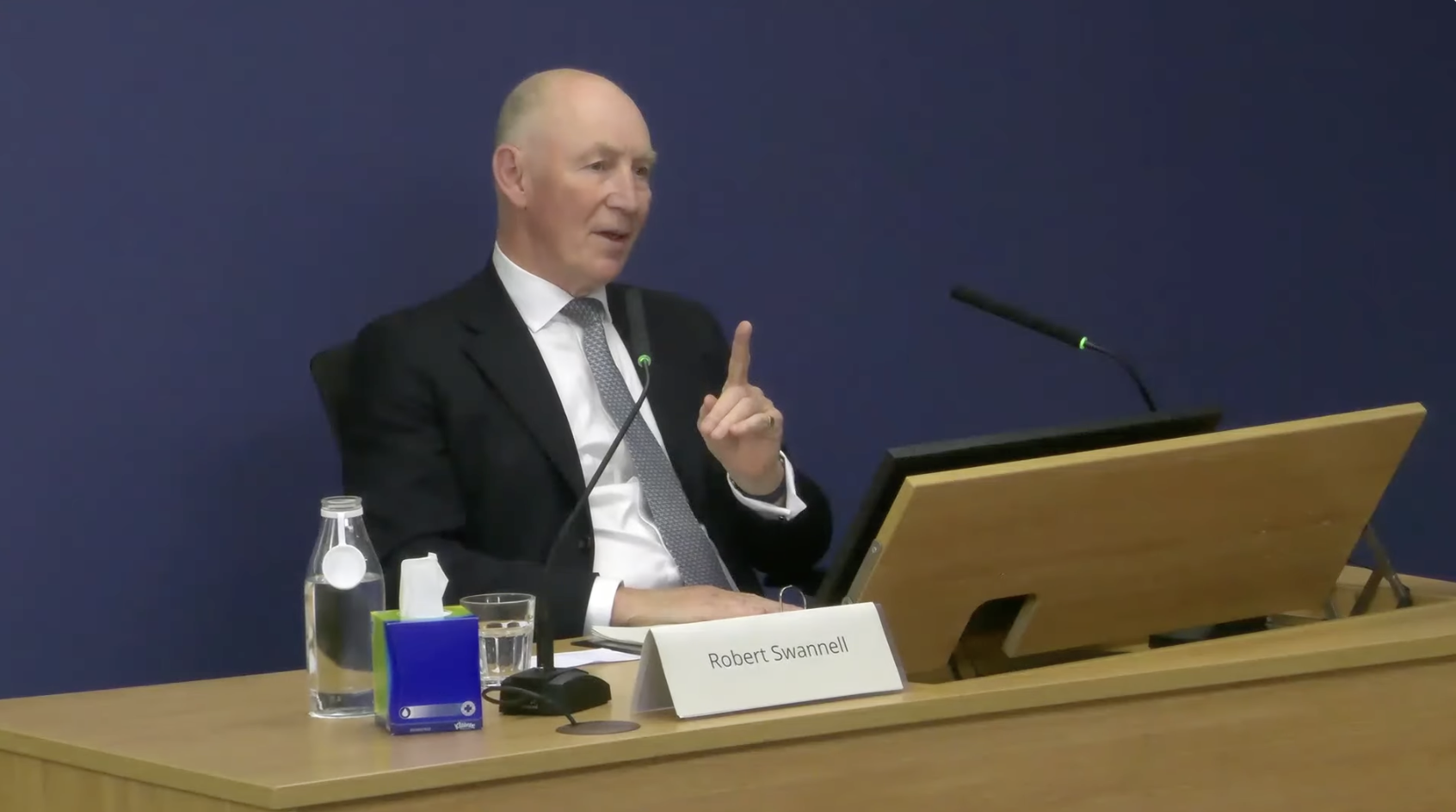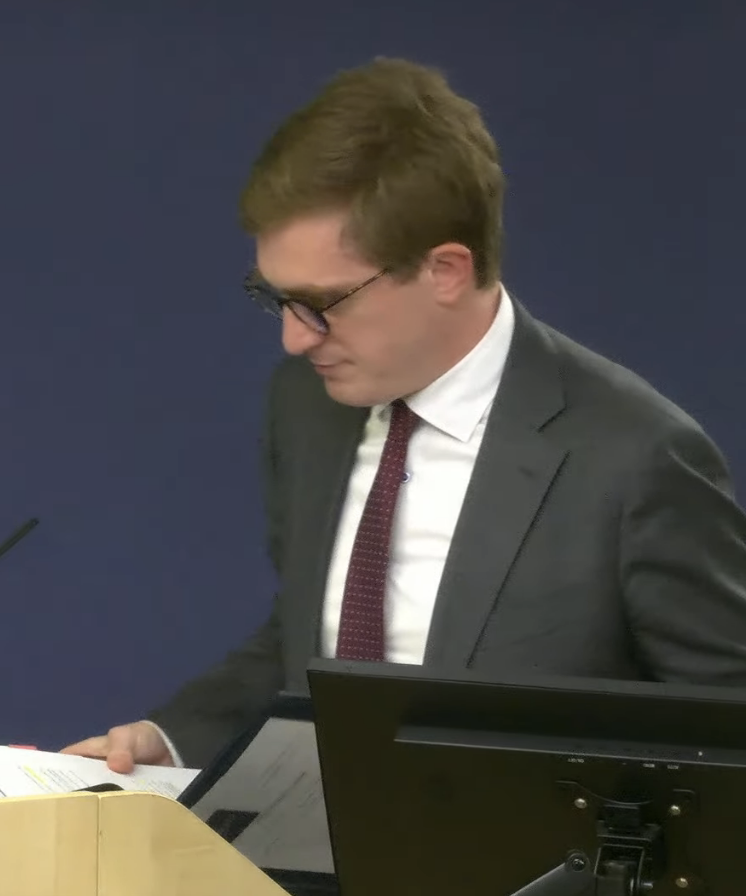
Robert Swannell is a former accountant and barrister with more than thirty years experience as an investment banker and director of large companies (including six years as chair of Marks and Spencer). He is therefore a big deal. Big deals rarely feel they get things wrong.
Swannell had two articles of faith – the first was that he massively improved the Shareholder Executive/UK Government Investments risk reporting whilst he was at the organisation (ShEx became UKGI) and the second was that ShEx/UKGI’s failure to spot the Post Office scandal until March 2019 was because up until that point the Post Office had concealed the truth from their government paymasters.
Sam Stevens put the questions to Swannell on behalf of the Inquiry. I think it was his best performance to date. Stevens worked carefully, waiting until Swannell’s guard was down before gently skewering the narrative Swannell had prepared for the “benefit” of the Inquiry.
Stevens started by taking Swannell to the Shareholder Executive terms of reference and a bullet point which noted that ShEx was required to monitor its assets ie government-owned companies like the Post Office and “assess individual high-priority or high-risk transactions, projects or other situations where ShEx is actively involved.”
Was this, Stevens asked “to ensure that the asset was being appropriately overseen by the executive of ShEx?”
Swannell agreed. He told Stevens it was “where the risk register showed that there were particular high risks, either in impact or probability, or mainly both, that the board of ShEx… UKGI… had a good handle on what was going on within the organisation.”
Stevens asked if these “deep dives” – a phrase Swanell had used several times in his witness statement – were to “ensure… the executive of the Shareholder Executive – were appropriately overseeing the asset?”
Swannell replied with an illustration:
“The point at which I became aware that everything we’d been told about Horizon was incorrect… was in March 2019… and at that point you will see that the cadence of deep dives into the Post Office is extraordinary, and it goes from, as it was, not being on high on the risk register to being the focal point of the board’s attention.”
This was, said Swannell, the ShEx board “doing precisely what it should be doing”.
To a point, Lord Copper. What was ShEx doing on Swannell’s watch before 2019? Why did the organisation tasked with measuring and managing the Post Office’s business risk require an existential court battle and damning High Court judgment to finally smell the coffee?
Stevens took Swannell to the ShEx handbook, produced in 2007. He noted the Post Office’s responsibility to “seek an honest, open and ongoing dialogue with the government as shareholder” and that it “should operate a no-surprises policy, ensuring that the government as shareholder is informed well in advance of anything potentially contentious in the public arena.”
Stevens wondered if ShEx should have taken steps to ensure the Post Office was complying with this obligation.
“I believe that that’s exactly what they were doing” said Swannell.
Did Swannell know the Post Office was carrying out post-conviction disclosure work? As Stevens put it, deciding “whether or not documents should be disclosed to Subpostmasters who had been convicted of criminal offences.”
Swannell told Stevens he did not find this out until he was preparing for the Inquiry.
Risk, innit

Swannell was proud of his record on risk. He told Stevens:
“I placed risk as being one of the first items to be discussed at every UKGI board, so that the board meeting would start with the chief executive’s report, there would be a people report… and then there was risk… every risk that over the previous month had changed in character would be highlighted for the board and then the whole of the risk register, the composite risk register, would be set out for the UKGI board.”
“I did that because I saw that as the best way (in an organisation looking after a whole portfolio of interests) that you can best direct the board’s time to the things that have been flagged, hopefully appropriately, as the highest risk aspect.”
Stevens asked if by the time he assumed the role of Chair of ShEx/UKGI in November 2014, Swannell was aware of the Second Sight investigation?
“Absolutely not”, replied Swannell.
“Were you aware about the Post Office and government announcements in relation to the mediation scheme?” asked Stevens.
“I wasn’t.”
“Were you aware that the CCRC had been corresponding with Post Office regarding past convictions?” tried Stevens.
“I wasn’t”, repeated Swannell.
Swannell agreed that if everyone had been doing their job properly he should have been made aware of all of the above (as well as the Post Office’s post-conviction disclosure work). So what went wrong?
Curiosity and Culture
It’s here Swannell’s unifying theory kicked in:
“It’s clear to me, it was clear to us then, and by then I mean in 2019, that the culture at the post office was shocking, and by that I mean it was a closed, defensive culture that was not in the business of giving information. I can’t tell you whether information was withheld deliberately or whether they simply didn’t give it but whatever the reason there was there were a whole range of things that should have been known to the board of the Post Office, and then therefore to the direct UKGI board member and as a result of that to the UKGI board.”
Swannell intimated that had this culture been different, the problems would have reached the Post Office Board and UKGI well before March 2019. He then added his second element to the mix, positing the idea that when “an incomplete curiosity, if I can put it that way, meets a toxic culture, bad things happen”.
Stevens wondered if this “incomplete curiosity” was limited to the Post Office.
“Well, it’s of the Post Office,” Swannell replied “but we have to acknowledge that ShEx had a member on the Post Office board.”
Two of those three ShEx/UKGI Post Office board members will be giving evidence over the course of this week.
Having allowed Swannell to throw his colleagues under the bus, Stevens turned to Swannell’s great achievements on getting risks fronted and centred at ShEx/UKGI board meetings. He turned to a September 2014 heat map – something favoured by the organisation in the middle of the last decade. Stevens told the Inquiry that the Post Office’s risk profile was marked as Red/Amber, and, reading from the notes, said:
“if not managed successfully, collectively the risks have potential to significantly impact the commercial strategy and financial sustainability of Post Office Limited, jeopardising the long-term policy objectives of transformed network, reducing HMG funding and mutualisation.”
Stevens noted the blurb “doesn’t expressly identify what the risks are, does it?”
“No”, replied Swannell.
Stevens went on: “Under reputational risks it says ‘there is a significant political interest in the Post Office network… the ShEx/Post Office team are aware of the pressures and are working collaboratively with Post Office Ltd to manage risks away’. Again this doesn’t identify any risk expressly does it?”
“No it doesn’t”, admitted Swannell.
“And it doesn’t say how the Post Office team are mitigating the risks?”
“It doesn’t”, agreed Swannell.
“This risk register raises more questions than it actually answers” concluded Stevens.
Swannell did not disagree, but pointed out this board paper was before his time as Chair. After he became Chair, he told Stevens, “there’s no question that we improved the governance” so that “it would have been almost impossible to have such… an imprecisely described risk in the new regime.”
Stevens took him to a UKGI board risk register from November 2018, whilst the first trial of Bates v Post Office was actually underway. In this document the Post Office’s reputational risk is reduced from red to amber and here the blurb states this was due to “improved performance, making Post Office Ltd profitable and therefore increasingly self-sufficient financially.”
“Again, this document wasn’t highlighting expressly what the risks to Post Office were, was it?” asked Stevens.
“Correct”, replied Swannell.
“Why did the board think that that type of information was sufficient to challenge the executive on whether it was identifying risks appropriately?” asked Stevens.
Swannell tried to see if there was any further information available in the document. There wasn’t. He replied:
“I can’t answer that. I can’t recall why that would have been sufficient or was at the time, or what was said at the meeting. I think it’s a perfectly fair question.”
Miscarriages of justice, dude
Stevens took Swannell to a briefing note Swannell received before a meeting with Tim Parker, the Post Office chair, in July 2016. Stevens read out a section which noted “Tim may mention legal action being brought against Post Office in respect of its IT system Horizon and the claims that it wrongfully prosecuted/sacked a small number of agents.”
“Being aware of this allegation”, Stevens said “can you explain why you didn’t take steps to see that this allegation of wrongful prosecution… wasn’t included on the risk register?”
“I can’t explain, no,” replied Swannell “I think I would say that this is a three-page note and this is the last item on it, and that puts it in some context.”
“Well it says it’s an allegation of wrongful prosecution, that’s a serious matter isn’t it?” countered Stevens.
“It is, if I understood what wrongful prosecution meant”, attempted Swannell, the former barrister.
“Would you accept, based on being on notice of there being claims of wrongful prosecution, that you should have done more to see that this allegation was put on the risk register?”
Eventually, Swannell conceded. “Obviously with the benefit of hindsight… I would wish that I had. I didn’t.”
For a real-time gallop through the day and its documents (Swannell answered questions from around 2.30pm onwards), do have a look at the live tweets.
For a report on Tuesday morning’s ShEx/UKGI witness, Mark Russell, click here.
The journalism on this blog is crowdfunded. If you would like to join the “secret email” newsletter, please consider making a one-off donation. The money is used to keep the contents of this website free. You will receive irregular, but informative email updates about the Post Office Horizon IT scandal.

Leave a Reply